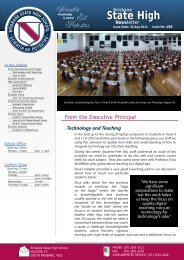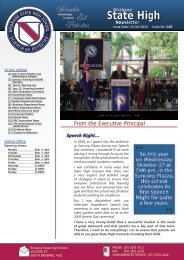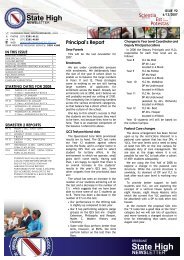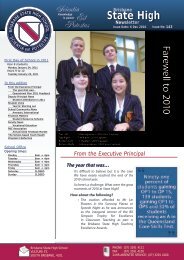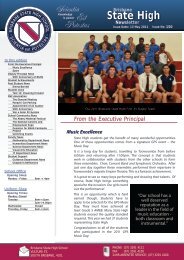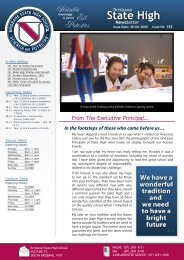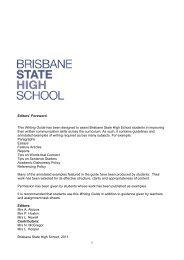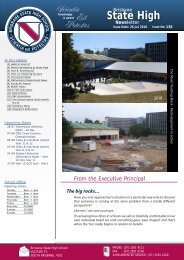2012 Year 8 Curriculum Guide - Brisbane State High School
2012 Year 8 Curriculum Guide - Brisbane State High School
2012 Year 8 Curriculum Guide - Brisbane State High School
You also want an ePaper? Increase the reach of your titles
YUMPU automatically turns print PDFs into web optimized ePapers that Google loves.
BRISBANESTATEHIGHSCHOOL<strong>Year</strong> 8 <strong>Curriculum</strong> <strong>Guide</strong><strong>2012</strong>
Contents – <strong>Year</strong> 8, <strong>2012</strong>The <strong>State</strong> <strong>High</strong> <strong>Curriculum</strong>Learning AreasMajors and MinorsOpportunities for Extension and EnrichmentLearning Area EnglishLearning Area Health and Physical EducationLearning Area Humanities and Social SciencesLearning Area LanguagesLearning Area MathematicsLearning Area ScienceLearning Area TechnologyLearning Area The Arts
The <strong>State</strong> <strong>High</strong> <strong>Curriculum</strong><strong>Brisbane</strong> <strong>State</strong> <strong>High</strong> <strong>School</strong> has a diverse range of subjects that can be studied in <strong>Year</strong>s 8 to 12. This is in parta function of our size, but also a product of our commitment to meeting the learning needs of a diverse studentpopulation with different strengths, areas of interest and future aspirations.The foundations of the <strong>School</strong>’s academic curriculum which guide the teaching and learning at BSHS include:Teaching, Learning and <strong>Curriculum</strong> – <strong>State</strong>ment of PrinciplesHabits of MindThe use of ICTs to support and enhance student understanding andThe development of students’ multi-literacies<strong>High</strong>er order thinking and problem solvingIn summary, we aim to create a curriculum structure that balances both student choice and our commitment toproducing well rounded individuals that participate well in broader society as young adults.Learning AreasThere are eight Learning Areas (previously called KLAs or “Key” Learning Areas) around which our <strong>Year</strong> 8 and9 <strong>Curriculum</strong> are structured.These Learning Areas are:English, Languages, Mathematics, Science, Health and Physical Education, Technology, Humanitiesand Social Sciences, The ArtsIn <strong>Year</strong>s 8 and 9, students must choose at least one semester unit from each of these Learning Areas. Studentchoice operates in two ways:choosing subjects within a Learning Areachoosing the Learning Areas they wish to study as a MajorThe subjects within each Learning Area in <strong>Year</strong>s 8 and 9 are as follows:Learning AreaSubjects available in the Learning AreaEnglishEnglish, Aspire EnglishHealth and Physical EducationHumanities and Social SciencesLanguagesHealth and Physical EducationHistory, Geography, Aspire Humanities (History andGeography)French, German, Italian, Japanese, Modern GreekMathematics Mathematics, Fast Track Mathematics (Sem 2)Science Science, Fast Track Science (Sem 2)TechnologyThe ArtsBuilt Environment and Engineering (BEE), Technology& Design, Aspire Engineering, Business Studies,Digital Art and Design (DAD), Information TechnologyDance, Digital Art and Design (DAD), Drama, Media,Music, Visual Art, Aspire Visual Art
Selecting <strong>Year</strong> 8 Semester Units1. A Learning Area can be undertaken as a Major or Minor study.2. English, Mathematics and Science must be studied for two semesters (Major).3. Subjects within each Learning Area are either two semester units in length or one semester unit in length.4. Twelve semester units of study must be selected for the year.5. History must be studied by all students for one semester (Minor).6. Aspire (Enrichment) subjects are two semesters in length and therefore can only be studied as a Major.7. Only one Aspire subject can be chosen from Aspire Humanities, Aspire Engineering, Aspire Art.8. Not all subjects are available as Unit 1 and Unit 2 – refer to the details provided in each Learning Area.9. DAD (Digital Art and Design) is studied for one semester in the Arts and Technology (a Minor in eachLearning Area). However, if students choose to study DAD as well as another semester unit in either ofthese Learning Areas then this is a Major study.To ensure a deep understanding of a subject within a Learning Area, students are expected to continue asubject from <strong>Year</strong> 8 into <strong>Year</strong> 9. Exceptions may be made only after discussion with the relevant Head(s) ofDepartment.Structure of the <strong>School</strong> Day<strong>Brisbane</strong> <strong>State</strong> <strong>High</strong> <strong>School</strong> operates four 70 minute lessons each day.Six subjects are studied in any one semester.Each subject is timetabled for three 70 minute lessons each week.Opportunities for Extension and EnrichmentAspire Subjects<strong>Brisbane</strong> <strong>State</strong> <strong>High</strong> <strong>School</strong> is proud of the high academic calibre of its students. We offer an enrichmentcurriculum for students in which higher order, creative and lateral thinking, pace, complexity of challenge,appropriate degrees of independence and the development of the whole student are encouraged. These Aspiresubjects will be studied by students with an interest in developing their skills to a very high standard. To besuccessful in these subjects, students will need to be:highly motivatedable to commit to independent workbe interested in developing their creative and critical thinking skills.Aspire subjects are considered a Major study in that Learning Area and as such, are studied for all of <strong>Year</strong> 8.Only one Aspire subject can be chosen from Aspire Humanities, Aspire Engineering, Aspire Art. To ensuredeep understanding of Aspire subjects, students are expected to continue an Aspire subject from <strong>Year</strong> 8 intoyear 9. Exceptions may be made only after discussion with the relevant Head(s) of Department. Any vacanciesthat may exist in <strong>Year</strong> 8 Aspire subjects will be filled at the discretion of the relevant Head of DepartmentFast Track Mathematics and Science<strong>Brisbane</strong> SHS also offers some students a fast track mathematics and/or science pathway. These uniquecourses are designed for students who are exceptionally gifted and talented at mathematics and/or science andculminates in students finishing their <strong>Year</strong> 12 maths and/or science six months earlier. This allows them tostudy a University maths and/or science subject as part of their normal timetable. A selection process will beconducted during the first semester of year 8 for students wishing to apply for a fast track pathway in mathsand/or science. These courses begin in Semester 2, <strong>Year</strong> 8.
Consolidation and Learning SupportFor students experiencing some difficulty with their studies, the school provides support options through ourcurriculum structure. In English and Mathematics, consolidation options are offered to students who arestruggling to pass these subjects and require more intensive support. Learning Support teachers will alsoendeavour to meet the needs of learners requiring support by enrolling them in tutoring and extra tuition in classtime.Habits of MindHabits of Mind, which develop thinking skills in students are a significant part of our academic program. For<strong>Year</strong> 8 students, the Habits will be embedded into each subject they study. The Habits of Mind are a commonlanguage to describe a rich range of different learning processes in which students should be involved.8-12 <strong>Curriculum</strong> Framework<strong>Year</strong> 8 and 9 students at <strong>Brisbane</strong> <strong>State</strong> <strong>High</strong> <strong>School</strong> study a curriculum set down by the Queensland StudiesAuthority and the Australian <strong>Curriculum</strong>, Assessment and Reporting Authority (ACARA). The aim of the <strong>Year</strong> 8and 9 <strong>Curriculum</strong> is to introduce students to a range of subjects, whilst allowing them to choose to study more insubjects where they have more interest. In <strong>Year</strong>s 10, 11 and 12 students study from Senior Syllabuses writtenby the Queensland Studies Authority. Students at <strong>Brisbane</strong> <strong>State</strong> <strong>High</strong> <strong>School</strong> choose six subjects (orequivalent) to achieve their Queensland Certificate of Education (QCE) and receive an Overall Position (OP) fortertiary entrance.<strong>Year</strong> 8, <strong>2012</strong>Australian <strong>Curriculum</strong>EnglishMathsScienceHistoryQueensland Essential LearningsGeographyThe ArtsLanguagesTechnologyHealth & Physical Education
Learning Area EnglishThere are two choices for students in this Learning Area:1. English2. Aspire EnglishBoth English subjects can be selected as a Major only.1. EnglishIn English, students use their imagination, creativity and world views to interpret and construct English texts thatshare their ideas, analyse, persuade audiences and address issues and events in their own lives andcommunities. They recognise how English relates to shared cultural understanding and to local, national andglobal settings.<strong>Year</strong> 8, <strong>2012</strong> will follow the Australian <strong>Curriculum</strong> for English and will be based on the integrating idea of‘belonging’. Students will explore this in Semester 1 within their immediate local context and then their broaderglobal context in Semester 2.<strong>Year</strong> 8 English is comprised of the following strands:LanguageLiteracyLiteratureIn English, students learn the following skills:demonstrating and analysing the relationship between audience subject matter, purpose and text typeidentifying main ideas and the sequence of events, making inferences and drawing conclusions based ontheir understanding of the reliability of ideas and information across textsinterpreting and analysing how language elements, including literal and figurative language, and otheraspects of texts, position readers, viewers and listenersconstructing literary and non-literary texts by planning and developing subject matter according to specifictext structure, and manipulating language elements to present particular points of viewmaking judgments and justifying opinions about how the qualities of texts contribute to enjoyment andappreciation2. Aspire EnglishCentred on the idea of ‘belonging’, the Aspire English course involves significant student directed inquiry.Students will select issues of importance to their own lives and these will serve as the centre of theirinvestigation and reflection. After developing a central inquiry question to underpin an action research project,students will work independently and in groups throughout the semester to explore their personal response toissues as they are reflected in literature and everyday texts, and the world around them.A wide and varied reading program underpins Aspire English.The Habits of Mind for <strong>Year</strong> 8 EnglishThinking and communicating with clarity of precisionApplying past knowledge to new situationsThinking about your thinking (metacognition)Listening with empathy and understanding
Learning Area Health and Physical EducationHPE provides a foundation for developing active and informed members of society, capable of managing andinteracting between themselves and the social and physical environments in the pursuit of good health. Avariety of delivery modes will be utilised where higher order thinking and problem solving are encouraged.Students may choose a Major or Minor in HPE.<strong>Year</strong> 8 Health and Physical Education is comprised of the following topics:1. Nutrition2. Fitness3. Adolescent development4. AnatomyTopic 4 is studied in a HPE Major only.In HPE, students engage with the following practical domains:1. Athletics2. Introductory aquatics3. Motor development4. Life saving5. Sof-crosse6. Cricket7. Advanced athleticsPractical domains 4-7 are studied in a HPE Major only.The following skills are incorporated into a study of HPE:working independentlyworking interdependentlylibrary, internet and database research techniquescomprehending, analysing and evaluating from a variety of sourcessynthesising information from a variety of sources and perspectivesforming arguments and hypotheseswriting paragraphs, essays and reportsThe Habits of Mind for <strong>Year</strong> 8 Health and Physical Education:Thinking flexiblyStriving for accuracy and precision
Learning Area Humanities and Social SciencesThere are three choices for students in this Learning Area:1. History (mandatory)2. Geography – one semester (Minor only)3. Aspire Humanities – History and Geography (major)All <strong>Year</strong> 8 students must study History as a mandatory subject for one unit1. HistoryHistory is the study of people, events and place over time. A strong emphasis is made in this course in linkingevents from the past with issues and developments of the present. The course has been designed according tothe Australian <strong>Curriculum</strong>: History for <strong>Year</strong> 8.<strong>Year</strong> 8 History is comprised of the following topics:1. Medieval Europe2. Medieval Japan3. Renaissance and Age of Exploration and DiscoveryIn History, the following skills are learnt:library, internet and database research techniquescomprehending, analysing and evaluating primary and secondary sourcessynthesising information from a variety of sources and perspectivesforming arguments and hypotheseswriting paragraphs and essayspublic speaking techniquesuse of historical terms and conceptsThe Habits of Mind for <strong>Year</strong> 8 History:Thinking and communicating with clarity and precisionThinking flexibly2. Geography<strong>Year</strong> 8 Geography is comprised of the following topics:1. Finding your way (basic geographic skills and mapping)2. Difficult environments3. Poverty and global inequalityIn Geography, the following skills are learnt:develop spatial literacy skillsanalysing and interpreting data from graphs, tables, photos, maps and drawingscreating digital maps with multiple layers in ArcView software package
writing paragraphs and reportscollecting and interpreting data in the fieldusing geographic inquiry to understand current issuesThe Habits of Mind in <strong>Year</strong> 8 Geography:Listening with empathy and understandingApplying past knowledge to new situations3. Aspire Humanities – History and GeographyBased on the History and Geography courses listed above, this is a full year enrichment course for studentswith an interest in the Humanities and Social Sciences. The course is framed around six ‘Big Ideas’ of globalsignificance: war and peace, power, social and political systems, science and technology, civilisation andreligion.There is an emphasis on higher order thinking and the embedding of philosophical approaches when dealingwith challenging subject matter. The teaching approach is based around different cooperative learning anddecision making strategies.The topics will include:Medieval Europe, with a focus on religion, power, war and peaceMedieval Japan, with a focus on war and peace, social and political systemsRenaissance and Age of Exploration and Discovery, with a focus on science and technology, civilisation,Where in the world? (using Geography skills to negotiate a journey around the world)Population, migration and global inequalityHall of Fame or Infamy – negotiated individual project based on the legacy of an individual studied in the courseIn Aspire History and Geography, the following skills are learnt:deciphering different types of mapsanalysing and interpreting data from graphs, tables, photos, maps and drawingscreating digital maps with multiple layers in ArcView software packagewriting paragraphs, essays and reportscollecting and interpreting data in the fieldusing geographic inquiry to understand current issueslibrary, internet and database research techniquescomprehending, analysing and evaluating primary and secondary sourcessynthesising information from a variety of sourcesforming arguments and hypothesesusing criteria to make decisionsevaluating issues, events and people from a variety of perspectives
Learning Area LanguagesThere are five choices for students of <strong>Year</strong> 8 in this Learning Area:1. French2. German3. Italian4. Japanese5. Modern GreekLanguages can be studied as a Major or MinorOf these languages, French, German and Japanese are offered as either a Continuing course or Beginningcourse, based on primary school language learning.For Italian and Modern Greek, both Continuing and Beginning students are integrated into the same course.Students who learned at Primary school one of the languages offered at <strong>Brisbane</strong> <strong>State</strong> <strong>High</strong> <strong>School</strong> areexpected to continue learning that language in <strong>Year</strong> 8.Beginning students are those who wish to either: Start a new language in <strong>Year</strong> 8Consolidate their language learning from primary schoolContinuing students are those who:Have studied a language at primary school for two years or moreFor Japanese, have a knowledge of the hiragana scriptThe common elements of all Language courses offered at <strong>State</strong> <strong>High</strong> are: A focus on the four skills of :• Listening• Speaking• Reading• WritingIntegrating cultural understanding with language learningAn experience of the cuisine of the countryIncorporate the latest ICTs to enhance language learning experiencesOpportunities to interact with exchange students from the countryFor all Languages, the topics studied are drawn from the following:1. Personal identity2. <strong>School</strong> routines3. Family and friends4. Expressing likes and dislikes
5. Place and time6. Daily routines7. Holidays and festivalsA Minor study will consist of one semester of language development as described above. A Major study willconsist of one semester of language development. The second semester will consist of either: the study ofanother language (only recommended for students who continued the same language study from Primaryschool) OR cultural investigations including: social and cultural environment of selected country; customs,traditions, beliefs, history and geography of the country.The Habits of Mind for <strong>Year</strong> 8 Languages:Listening with empathy and understandingApplying past knowledge to new situations
Learning Area MathematicsMathematics must be selected as a Major only.1. MathematicsMathematics in <strong>Year</strong> 8, <strong>2012</strong> will involve components of the National <strong>Curriculum</strong> for Mathematics.Mathematics involves the study of the following three strands:1. Number and Algebra2. Statistics and Probability3. Measurement and GeometryIn Mathematics, the students learn the following skills and processes:understanding and fluency with mathematical conceptsproblem solving and investigation of mathematical scenariosreasoning and communicating ideas in a variety of waysusing technology to aid mathematical skillThe Habits of Mind for <strong>Year</strong> 8 Mathematics:PersistingManaging impulsivity
Learning Area ScienceScience can be selected as a Major only.1. ScienceIn Science, students are actively involved in investigations about the world using scientific inquiry methodsincluding questioning, planning and conducting experiments. They engage in investigations based on collectingand analysing data, evaluating results, communicating results and drawing critical, evidence based conclusions.Students develop their scientific understanding via contexts that highlight the historical, and cultural aspects ofscience as well as contemporary issues and activities.In <strong>Year</strong> 8 Science, the learning experiences of students will centre on the curriculum focus of explainingphenomena involving science and its applications.The course will engage the students in the exploration of the overarching ideas of; patterns, order andorganisation, form and function, stability and change, matter and energy, systems and scale and measurement.<strong>Year</strong> 8 Science is comprised of the following term unit:1. Matter2. Energy Converters3. Multiplying to Divide4. Let’s RockThe following Science Inquiry skills are incorporated into the <strong>Year</strong> 8 Science course:Planning and conductingProcessing and analysing dataProcessing informationEvaluatingCommunicatingThe teaching strategies utilised in the delivery of this course acknowledges science as a human endeavour, andwill foster collaborative laboratory and research skills.The Habits of Mind for <strong>Year</strong> 8 Science:Questioning and problem posingThinking and communicating with clarity and precisionGathering data through all senses
Learning Area TechnologyThere are 6 choices for students in this Learning Area:Major or Minor study1. Built Environment and Engineering2. Technology & Design3. Aspire Engineering (Major only)Minor study only4. Business Studies5. Information Technology6. Digital Art and Design (combined with The Arts)1. Built Environment and EngineeringIn this subject, students will gain the fundamental knowledge in methods of drawing and designing forArchitecture and Engineering. There is a strong emphasis on real life applications, using industry standardsoftware.Topics:1. Introduction to CAD (Computer-Aided Design)2. Landscape architecture3. Graphical communication drawing4. Graphic design concepts5. 2D and 3D elements and principles of design6. Computer game / fashion magazine context based folio7. Advertising and marketing(Topics 4-7 studied only in a Built Environment and Engineering Major)In Built Environment and Engineering the following skills are learnt:designing and creating context based design foliosplanning – investigating and research techniques, interpreting, sketching ideas and communicatingrefining– critical thinking to problem solve, optimising and evaluating a designproducing 2D and 3D computer aided drawings whilst applying formal standards and conventionslearning to use industry standard software (Catia, Revit Architecture, AutoCAD, Corel Draw and the Adobesuite of design programs)The Habits of Mind for <strong>Year</strong> 8 Built Environment and Engineering:Thinking about your thinking
2. Technology & DesignTechnology & Design focuses on the development of manual, electronic and technological skills in thedesigning and manufacturing of products in timber, metal, plastics, composites and textiles. Students expandtheir capabilities as confident, critical and creative designers and users of technology.<strong>Year</strong> 8 Technology & Design is comprised of the following topics:The Design ProcessProperties of MaterialsApplied Mathematics and ScienceComputer aided design and computer aided manufacturing (CAD-CAM) utilising a CNC lathe. (Major study)In Technology & Design, the following skills are learnt:Sketching and /or formally drawing design solutionsSafe use of machine, hand and power tools in accordance with OH&SMetal manipulation, timber joining, shaping and finishingPlastic thermoforming and solvent bondingDesign and documentation of the design process using ICTThe Habits of Mind for <strong>Year</strong> 8 Technology & Design:Managing impulsivity3. Aspire EngineeringAspire Engineering builds on lateral, creative and higher order thinking by delving into all facets of Engineeringin real world contexts. A variety of delivery mediums will be utilised in order to create an environment wherecreative thinking and problem solving is encouraged. The use of guided practical and theoretical activities,design tasks and group work is integral to the program. <strong>High</strong>er order thinking will be evident in the designprocess, ways of thinking, and problem solving required for all classroom activities and assessment.The students’ main focus for <strong>Year</strong> 8, in mechanical engineering, will utilise both industry standard software aswell as theoretical concepts. The students will also be required to design, make and test a medieval trebuchetthrough the use of engineering concepts.Study topics will include:1. Manufacturing Engineering2. Mechanical Engineering3. Civil Engineering conceptsIn Aspire Engineering the following skills are learnt:Learning to use industry standard 3D modelling software, in CATIA;Utilising CATIA to design and create trebuchet and engineering componentsUtilising software to manufacture trebuchet and engineering components with a laser cutterAnalysing and testing different types of materialsEngage and apply engineering mechanics and materials theory to practical componentsThe Habits of Mind for <strong>Year</strong> 8 Aspire Engineering:Questioning and problem solving
4. Business StudiesStudents learn about the principles of business operations, including finance, banking and legal issues affectingbusinesses and households. IT applications are integrated into the programme of study.<strong>Year</strong> 8 Business Studies is comprised of the following topics:1. Goal setting2. Personal financial records and personal credit3. Financial planning – budgeting and spreadsheetingIn Business Studies, students learn the following skills:analysing and evaluating business and personal financial decisionsinterpreting and evaluating legal and ethical issuesworking in a teamwriting reportscreating complex worksheets in Excel, including formulaeThe Habits of Mind for <strong>Year</strong> 8 Business Studies:Thinking interdependentlyApplying past knowledge to new situations5. Information TechnologyStudents learn how to effectively use Information Communication Technology (ICT) applications in a variety ofcontexts. This subject is useful for students with a range of IT capabilities. Students will produce a digitalportfolio of work completed.<strong>Year</strong> 8 Information Technology is comprised of the following topics:1. Graphic design software2. Digital copyright3. Desktop publishing using Microsoft Word4. PhotoShopIn Information Technology, students learn the following skillsProblem solving through computer applicationsCreative thinking in planning, producing and evaluating original computer generated documents and images.Technical manipulation of images, text and data in popular software applicationsReport writingThe Habits of Mind for <strong>Year</strong> 8 Information Technology:PersistingManaging Impulsivity
6. . Digital Art and Design (DAD)Refer to “The Arts”.
Learning Area The ArtsThere are seven choices for students in this Learning Area:Minor study1. Dance2. Music3. Digital Art and Design (Taken over 2 semesters as a minor in Visual Art and a minor in Technology)4. MediaMajor study5. Drama6. Visual Art7. Aspire Visual Art1. DanceIn Dance practice, students explore a range of dance forms and styles through practical and theoreticalactivities. Students will be introduced to choreography, performance and appreciation. They will create dances,perform dances which are either teacher or student devised and will reflect upon dances and dance elements inwritten and oral form.No former experience in Dance is required to study this subject.<strong>Year</strong> 8 Dance is comprised of the following topics:1. Hip Hop and modern dance styles and their place in the history of dance2. Dance in music video3. Social, ritual and artistic functions of dance4. Dance in musical theatre (eg jazz, tap etc)In Dance, students develop the following skills and processes:the Elements of Dancesafe dance practiceschoreographic processesperformance techniquesappreciation model for reviewing Dance2. MusicIn Music practice, students will participate in activities designed to introduce the skills of aural and visualanalysis, singing and playing and reading and writing of music. Students will participate in solo and small groupvocal performance, composition activities, study music vocabulary and notation and generally explore a varietyof musical genre.Students of instrumental music will extend their skills of performance and other students will have access toclassroom instruments including keyboards, guitars and voice.<strong>Year</strong> 8 Music is comprised of the following topics:1. The Elements of Music2. Performing repertoire
3. Musical notation4. Student devised composition5. Analysis of studied pieces6. Aural notation and score reading7. Individual project or productions under the guidance of a teacherIn Music, students develop the following skills and processes:performing relevant repertoire in class (solo and small group)identifying and reproducing rhythmsnotating musiccomposing music on the pentatonic, major and minor scales with corresponding chord progressionusing studied music vocabulary and notation and reading scoresanalysing studied piecesnotating and performing melodies and rhythms3. Digital Art and Design (DAD)Please note: Places into this course are strictly limited. Students should complete the 4 semester integratedArts and Technology course. Opting in or out of this course will require an interview with the Visual Head ofDepartment.Students will explore innovative methods of integrating visual art concepts with technology and new mediafocusing on the creation of artwork for the contemporary digital age.<strong>Year</strong> 8 DAD is comprised of the following topics:1. 2D & 3D Animation2. Video and audio editing and short film creation3. Graphic Design using Creative Suite (PhotoShop, InDesign, Illustrator)4. The integration of Visual Art media with technology and new mediaIn DAD, students develop the following skills:problem-solving through creating multimedia products for authentic purposesresearch and evaluate a range of digital art modelsconducting a planning process using design ideation processanalysing and evaluating artworksdesigning multimodal presentationsstudio practice in drawing, painting and mixed media4. DramaIn Drama practice, students explore a range of dramatic forms and styles through practical activities. Studentswill be introduced to forming (making of drama), and responding (in written and oral forms). Students willparticipate in improvisations and practical activities serving to introduce the foundations of the actor’s anddramatist’s craft.<strong>Year</strong> 8 Drama is comprised of the following topics:1. The Elements of Drama (how Drama works)
2. Improvisation and characterisation3. Skills of performance – voice and movement4. Scripted drama5. The nature of comedy (including comic styles and creation of stand-up routines)(Topic 5 is studied in a Drama Major only)In Drama, students develop the following skills and processes:the Elements of Dramaimprovisational techniquescreating believable characterisationuse of voice, movement, space, focus etcexploring a range of theatrical forms, styles and contextsreading, analysing and performing scriptsreflecting upon performance and process in written and oral formsworking in groups5. MediaIn Media practice, students will participate in activities designed to develop the students’ general knowledge ofthe media recognising that media representations are constructed for specific audiences and specific purposesby manipulating media languages and technologies to shape representations.<strong>Year</strong> 8 Media is comprised of the following topics:1. The Elements of Media (print media, cinema, radio)2. Marketing formats and genre conventions3. Constructing and deconstructing audience influence4. Constructing media portfolios and marketing campaigns (print media, cinema, radio)In Media, students develop the following skills and processes:Interpreting the Elements of Mediaanalysing media languages and textscreative and technical skills pertinent to television, film, radio etcsurvey, interview and research skillsa selection of media ICTsreflecting upon media products in written and oral formssurvey, interview and research skillsa selection of media ICTsreflecting upon media products in written and oral forms6. Visual ArtIn studio practice, students explore a range of traditional art mediums and develop a diverse folio of work. Theyalso learn to write about art and develop skills of critical analysis and interpretation. Visual Art classes takeadvantage of their proximity to the Southbank cultural precinct by taking part in regular visits to exhibits.
<strong>Year</strong> 8 Visual Art is comprised of the following topics:1. Culture2. Identify3. Natural and built environments(Topic 3 is studied in a Visual Art Major only)In Visual Art, students develop the following skills and processes:studio practice in drawing, painting, ceramics, printmaking and electronic imagingdigital photography and PhotoShopdesigning multimodal presentationsanalysing and evaluating artworks7. Aspire Visual ArtThe Visual Art Aspire subject aims to extend students by providing them with opportunities to use and applycreative thinking and problem solving techniques. The program will incorporate an inquiry learning modelthrough the four phases of research, development, resolution and reflection.Studio work will encompass the traditional fine art practice of painting, printmaking, drawing and ceramics, aswell as contemporary information and communication technologies. Whilst the work will be teacher directed,there will be opportunities for individual negotiation and independent research particularly around thematicaspects of learning activities. Projects will have an element of collaboration in at least one of the four learningphases.The students will be involved in developing some online resources that will be accessible by other students (egin a ‘junior critic’ role). This is a unique opportunity offered exclusively to our school for students in this program.This has been negotiated with the Queensland Art Gallery. The students will have an important role incollaborating with QAG staff to help deliver their education resources to their target audience of young people.Our students will have access to lecture theatres and other ‘behind the scenes’ resources as part of thispartnership.Students taking part in the Aspire program will enjoy a special relationship and privileges with QAG and GOMAas part of regular class visits and a variety of learning experiences that promote an appreciation of art and therole of the artist in society.The Habits of Mind for <strong>Year</strong> 8 The Arts:Creating, imagining and innovatingResponding with wonderment and awe



